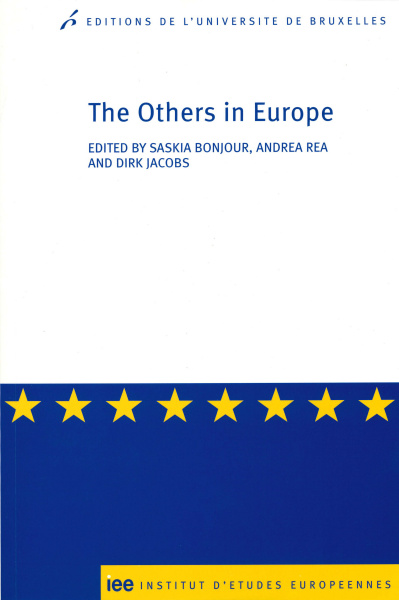The Others in Europe
Legal and social categorization in context
First Edition
This edited volume addresses the construction of identity classifications underlying the new forms of inclusion and exclusion that are to be found in contemporary Europe. Its scope covers practices of categorization and of resistance, both by majority groups. Read More
In contemporary Europe, the social tensions and political passions produced by immigration are increasingly linked to issues of belonging and identity. The representation of the foreigner is no longer solely defined by his or her place on the labour market or in the social hierarchy. In light of EU-enlargement and due to immigration flows, European societies are increasingly questioning their cultural and "ethnic identity". As a consequence, boundaries between "insiders" and "outsiders" are being redefined. The "others" in Europe are no longer merely those who do not have state citizenship of one of the member states of the Union. In the new European migration context, "otherness" increasingly refers to ethno-cultural minority groups, regardless of their EU citizenship status.
br>A mixed group of internationally established and younger scholars set out to investigate the categorisation of immigrants and their descendants as "Others" in Europe. They do so from their own disciplinary backgrounds ranging from Law, Anthropology, Sociology and Political Science to Social Psychology. This unique volume is hence trans-disciplinary in nature, shedding light from different angles on the issue of social and legal processes of categorization. The contributions analyse the continuities between the legal category of foreigner and the category of member of an "ethnicised" and discriminated minority, as apparent legal and social norms, public policies, institutional practices, social interactions and representations, as well as actors’ mobilizations, on the European, national, and local level.
Specifications
- Publisher
- Éditions de l'Université de Bruxelles
- Edited by
- Saskia Bonjour, Andrea Rea, Dirk Jacobs,
- Contributions by
- Alejandra Alarcon-Henriquez, Assaad Azzi, Didier Bigo, Philippe Bonditti, Saskia Bonjour, Emmanuelle Bribosia, Didier Fassin, Nicole Grégoire, Kees Groenendijk, Chloé Hublet, Dirk Jacobs, Julien Jeandesboz, Yves Pascouau, Pierre Petit, Francesco Ragazzi, Andrea Rea, Bruno Riccio, Julie Ringelheim, Isabelle Rorive, Maykel Verkuyten,
- Collection
- European Studies | n° 50
- ISSN
- 13780352
- Language
- English
- Supporting Website
- Oapen.org
- Publisher Category
- Publishers own classification > Law
- Publisher Category
- Publishers own classification > Political Science
- Publisher Category
- Publishers own classification > Sociology & Anthropology
- BISAC Subject Heading
- SOC031000 SOCIAL SCIENCE / Discrimination & Race Relations
- Onix Audience Codes
- 06 Professional and scholarly
- CLIL (Version 2013-2019)
- 3080 SCIENCES HUMAINES ET SOCIALES, LETTRES
- Subject Scheme Identifier Code
- Thema subject category: Ethnic studies
Paperback
- Publication Date
- 18 April 2011
- ISBN-13
- 978-2-8004-1506-2
- Extent
- Main content page count : 208
- Code
- 1506
- Dimensions
- 160 x 240 x 10 cm
- Weight
- 356 grams
- ONIX XML
- Version 2.1, Version 3
Google Book Preview
Contents
- Introduction | Andrea REA, Saskia BONJOUR and Dirk JACOBS
- Changing migration flows and European identity
The Europeanization of immigration and the re-categorization of the Other
Integration and risk management
The Europeanization of anti-discrimination policies
Denials of recognition and identity mobilization
- CHAPTER I. Categorizing human beings in EU migration law | Kees GROENENDIJK
- Immigrants, labels and laws
Dutch and German terminology for immigrants
Which categories are used in EU migration law
Historical development of the terminology
Conclusion
- CHAPTER II. Mandatory integration provisions in EC and EU Member States law
| Yves PASCOUAU - Integration provisions in EC and national law with regard to family reunification
and long term residents
Towards the extension of mandatory integration provisions
Conclusion
- CHAPTER III. Problematical Otherness: Defining and dealing with the Other in French
and Dutch civic integration abroad policies | Saskia BONJOUR - Introduction
The legal definition of the target group
Naming the problem and the problematic Other
Dealing with Otherness
Conclusion
- CHAPTER IV. Some foreigners more equal than others under EU law | Chloé HUBLET
- Introduction
The personal scope of Article 18 TFEU: an evolution at last?
The ECJ's position in Vatsouras and Koupatantze
The consequences of Vatsouras on the protection of TCNs against discrimination on grounds
of nationality
Conclusion
- CHAPTER V. Borders and security: the different logics of surveillance in Europe
| Didier BIGO, Julien JEANDESBOZ, Francesco RAGAZZI and Philippe BONDITTI - Border and security: decolonising the understanding of border from a security approach
Technology and EU bordering : not stopping people ; enhancer of freedom of circulation
or surveillance mechanism speeding up their travel?
Mobility and its government : speed instead of freedom
Border management practices in the EU
Ethical and political implications of security technologies in Europe
- CHAPTER VI. Reasonable accommodation of religious diversity in Europe and in Belgium:
Law and practice | Emmanuelle BRIBOSIA, Andrea REA, Julie RINGELHEIM and Isabelle RORIVE - Reasonable accommodation in Europe: The legal framework
Reasonable accommodation in Belgium
Conclusion
- CHAPTER VII. The social construction of Otherness | Didier FASSIN
- From borders to boundaries
From reluctance to recognition
From notion to concept
Conclusion
- CHAPTER VIII. Ethnic discrimination and minority identity: A social
psychological perspective | Maykel VERKUYTEN - Group identity lens model
Group identity reaction model
The integration paradox
Conclusion
- CHAPTER IX. Why do minorities rarely report experiences with discrimination?
Exploring qualitatively what inhibits or favours claims of discrimination
| Alejandra ALARCON-HENRIQUEZ and Assaad AZZI - Introduction
Methodology
Results
- CHAPTER X. Communitarian rhetorics within a changing context:
Belgian Pan-African associations in a comparative perspective
| Nicole GREGOIRE and Pierre PETIT - African diasporas and the emergence of African associations in Belgium
Pan-Africanism: A short historical overview
Pan-African associations in Belgium
Towards an interpretive community
- CHAPTER XI. Second generation associations and the Italian social construction
of Otherness | Bruno RICCIO - Introduction
Backlash against diversity
Second generation associations and the challenge of representation
Concluding reflections
- Bibliography
- Abbreviations
- Biographical notes

